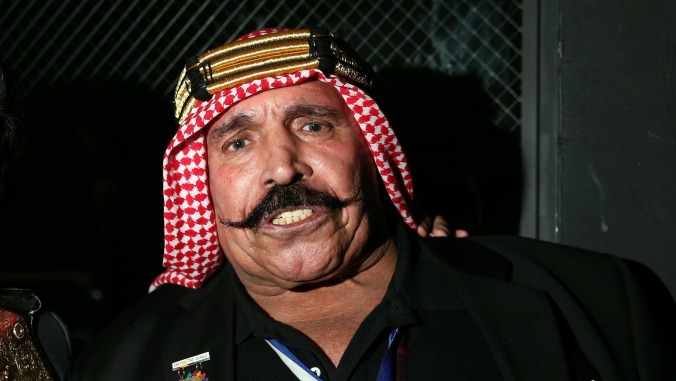R.I.P. The Iron Sheik, wrestling legend
The legendary wrestling villain, who helped launch Hulk Hogan's career, was 81

Hossein Khosrow Ali Vaziri, known to the world of wrestling—and Twitter—as The Iron Sheik, has died. One of modern wrestling’s legendary heels, Vaziri spent 50 years in the world of professional wrestling, cultivating a reputation as one of the medium’s greatest and most dedicated athletes and trash-talkers. Playing on the politics of the day to enhance his “villain” gimmicks, he was celebrated for his talent in the ring, his considerable physical strength, and his electric, combative energy during interviews and promotions. According to CBS News, Vaziri’s death was reported by his family today; he was 81.
Born in Iran in the 1940s, Vaziri gravitated to wrestling from an early age, competing for a spot in the country’s Greco-Roman wrestling team at the 1968 Olympics. He would shortly after move to the U.S., where he worked as a coach, serving as assistant coach to the U.S. Men’s team at Munich in 1972.
Not long afterwards, Vaziri moved into the world of professional wrestling, where he quickly adopted many of the trademark gimmicks that would define his career for the next 50 years, most of them playing on his Iranian heritage—shaved head, prominent buffo moustache, head scarf, etc. (Although the name itself wouldn’t come along for a few years; Vaziri wrestled as “The Great Hossein Arab” for the first several years of his career.) Most famously, he devised his own unique strength challenge to bully opponents with: Daring them to do reps with a pair of 75-pound Persian meel clubs in the ring—often, of course, as an excuse to attack them mid-lift.
Which is to say that Vaziri understood and embraced the villain’s role in professional wrestling as few others did: A few years later, during his most famous stint with the then-WWF, he teamed up with Russian wrestler Nikolai Volkoff for a multi-year partnership that saw each man play up national stereotypes (and the headlines of the day) to incite the rage of the crowds, waving Iranian and Russian flags while spitting at the name of America. Always happy to launch an insulting, vitriolic salvo at an opponent (or his happily adopted home country), Vaziri knew how to give the crowds exactly what they wanted; there’s a reason that the moment Hulk Hogan ascended from “rising star” status to national phenomenon came when he defied the Sheik’s infamous “Camel Clutch” to defeat him before a howling crowd at Madison Square Garden. Vaziri might have been playing for the cheap seats, but he was doing it with considerable skill and a finely-honed understanding of how to work the crowd.
Unfortunately, real-life incidents marred the continued rise of the Sheik’s career: In 1987, he and in-ring rival “Hacksaw” Jim Duggan were pulled over by police, and found to be in possession of drugs. Vaziri was placed on probation for a year; substance abuse issues would continue to crop up through the rest of his career, including leading to another departure from the WWF (this time as a manager) in 1997. His struggles with drugs only worsened in the early 2000s, after his eldest daughter, Marissa, was murdered by her boyfriend in 2003. (In a 2013 profile, Vaziri’s family talked about having to stop their father from rushing across the courtroom to kill his daughter’s murderer with a smuggled-in razorblade. The same piece reported that he’d been clean since 2009.)
Vaziri’s talents, and his impact on both the sport, and the WWF/E, were undeniable: He was inducted into the WWE Hall Of Fame in 2005 by none other than Robert “Sgt. Slaughter” Remus, with whom he’d feuded, and sometimes partnered, numerous times across the decades. Meanwhile, Vaziri also deployed his abilities as a transcendent shit-talker in other arenas, most notably with a series of ear-catching appearances on The Howard Stern Show that helped promote the idea of the Iron Sheik “brand” to a new generation. (See also his famed Twitter account, which was written by his managers, but which embodied his “say anything” tone.)
The Iron Sheik, the wrestler, was in many ways, a cartoon character. (Literally, in the case of 1980s Saturday morning series Hulk Hogan’s Rock ‘n Wrestling, where he appeared as a regular villain.) But Hossein Vaziri, the man, was a savvy and accomplished performer, combining incredible physical strength with a laser-precise talent for getting under people’s skin. Wrestling needs its villains, and Vaziri gave it one of its greats.
Vaziri died earlier today, in his Georgia home. No cause of death has been released.